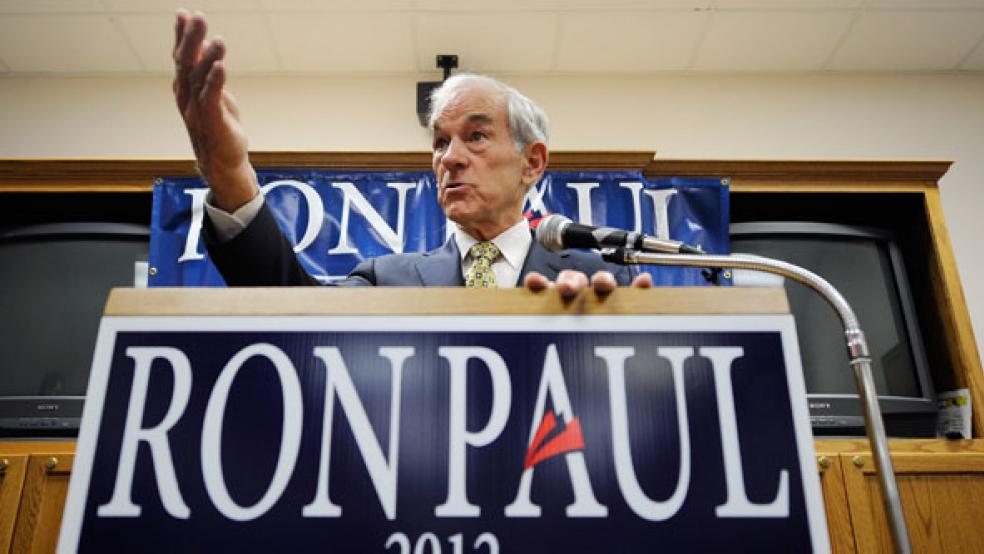If Ron Paul were elected president, you could probably smoke in public places, drive gas guzzling cars, keep your shoes on at airport security, and pray in public schools. His "hands off" approach to government has made him the de facto leader of the Tea Party and a long-time favorite of libertarians throughout the country.
You may think you know everything there is to know about Ron Paul, whose poll numbers have been rising dramatically as the Iowa caucuses approach. He’s the candidate who signed a pledge from Personhood USA, an anti-abortion-rights group, possibly because as an obstetrician-gynecologist throughout the 1960s and 1970s, Paul (a father of five) delivered more than 4,000 babies before entering politics in 1976.
The 76-year-old Paul also says he wants to:
-
Balance the federal budget
-
Eliminate the Federal Reserve
-
Defund five Cabinet departments (including Commerce, Interior and Education) to save over $700 billion over four years
-
Eliminate the supplemental nutrition program for women and children at the Department of Agriculture.
-
Bring home all American troops from Afghanistan and Iraq, and…
-
Legalize pot.
Paul, of course, has twice before campaigned for the presidency, once in1988 as the nominee of the Libertarian Party, and again in 2008 as a candidate for the GOP nomination. Then, as now, he plans to shrink the federal government. One way to do that is by for privatizing certain government functions, like the air-traffic control system.
Paul founded the Foundation for Rational Economics and Education (FREE) in the ‘70s, a tax-exempt organization that publishes newsletters, including “Ron Paul’s Freedom Report.” The Report espouses “an opportunity for greater public awareness of the limited-government principles that have been, until recently, absent from public debate.”
Although many agree with Paul’s positions on smaller government and lower taxes, they may bristle at his more controversial statements over the years about race and other social issues. Last Wednesday, Paul abruptly ended an interview with CNN’s Gloria Borger when she asked him about incendiary statements included in some of his past newsletters. One example, “If you’ve ever been robbed by a black teenaged male, you know how unbelievably fleet of foot they can be.” Paul distanced himself from these comments, saying he did not write them but that he was “morally responsible” for them since they went out under his name.
Many of Paul's positions have been given a full airing in speeches, campaign appearances, debates, bus tours and elsewhere, but the 12-term congressman’s book, Liberty Defined, while not a blueprint, is also rife with controversial positions and opinions.
In addition to the 9 points mentioned above, here’s a smattering of other Ron Paul notable viewpoints:
On 9/11:
Paul was the only Republican to vote against the Iraq War Resolution in 2008, claiming that the government used 9/11 as an excuse to curb civil liberties and invade Iraq.
On defense spending:
“Billions of dollars have been spent on the M-1 tank over the years and yet there has never been a need for it for the defense of our country – it was purely a military-industrial complex boondoggle to serve the interests of the demands of big business and big labor and to save Chrysler and at that time to stick it to General Motors. But in the end, General Motors got its bailout, too.”
On taxes:
“’Taxes are the price we pay for civilization,’ according to Oliver Wendell Holmes. This claim has cost us dearly… If we as a nation continue to believe that paying for civilization through taxation is a wise purchase and the only way to achieve civilization, we are doomed.”
On unions and government labor laws:
“Union power, gained by legislation, even without physical violence, is still violence. The laborer gains legal force over the employer. Economically, in the long run, labor loses… If only it were so easy to help the working class.”
On individual freedoms:
“Government should not compel or prohibit any personal activity when that activity poses danger to that individual alone. Drinking and smoking marijuana is one thing, but driving recklessly under the influence is quite another. When an individual threatens the lives of others, there is a role for government to restrain that violence.”
On markets, the individual, and Austrian economics:
“The phrase ‘Austrian School’ or ‘Austrian economics’ [as founded by Carl Menger] is not something I ever expected would enter into the vocabulary of politics… But since 2008, it has. Reporters use it with some degree of understanding, and with an expectation that readers and viewers will understand it too. This is just thrilling to me, for I am a longstanding student of the Austrian tradition of thought… We need markets to reveal to us the valuations of consumers and producers in the form of the price system that works within a market setting.”
On a welfare state:
“We need to surrender our attachments to government in every aspect of life. This goes for the right and the left. We need to give up our dependencies on the state, materially and spiritually. We should not look to the state to provide for us financially or psychologically… Let us understand that it is far better to live in an imperfect world than it is to live in a despotic world ruled by people who lord it over us through force and intimidation.”
On the power of liberty:
“Liberty built civilization. It can rebuild civilization.”


